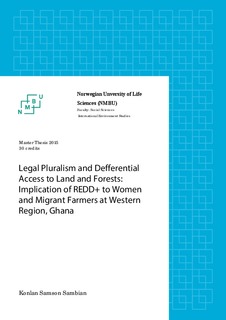| dc.contributor.author | Konlan, Samson Sambian | |
| dc.date.accessioned | 2015-08-04T09:44:57Z | |
| dc.date.available | 2015-08-04T09:44:57Z | |
| dc.date.copyright | 2015 | |
| dc.date.issued | 2015-08-04 | |
| dc.identifier.uri | http://hdl.handle.net/11250/294460 | |
| dc.description.abstract | Land is regarded as wealth creating and livelihood sustaining asset to gender and migrant farmers in the high forest zones in Ghana. However, the land tenure regime in Ghana is legally pluralistic and complex. Traditional authorities owned and control about 80% of land. Forest reserves are established on the land, which are managed by state agencies. Forest land with resources and timber on agriculture land except plantations are held, controlled and managed by the state in trust for the stool land owners.
The Idea of REDD is to reduce poverty and secure more sustainable development locally but this has gender dimension including migrant farmers. The nature of the legal pluralism in Ghana is likely to direct REDD benefit to land owners leaving women and migrant farmers who depend on forests and agriculture land for their livelihoods. The study will present land rights and exiting benefit sharing arrangements of gender and migrant famers and unfold their implication to REDD in the communities. It will be a useful guide to develop better benefit sharing mechanism that will include them. The study employed both quantitative and qualitative approaches. The quantitative data was gathered in 2012 but qualitative information was obtained from recent study.
It was found that the people practice matrilineal system of inheritance but women have limited land rights because land is passed to nephews and males of extended family. The women have only user rights. The existing sharing of benefit from land and forest has not factored in women. It was found that 9% of timber revenue given to traditional authorities for forest land ownership is used to maintain the status of the stool. The migrant farmers also have limited land rights and were engaged in share cropping arrangements and others were caretakers of cocoa farms. It was revealed that permanent migrants bought land but it is not recognized by the entire stool members.
It was found that both women and migrant famers use forest resources and land but they usually obtain permission from both the state and traditional authorities. Multiple legal systems make it difficult for migrant farmers to invest or benefit from forests and agriculture land. There should be land reform to regularize the traditional land tenure and adhere to human rights based approach. The authorities should follow strictly by the international human rights instruments, especially (CEDAW). This may enable women to enjoy bundle of rights to land and benefit from REDD activities. There should be land titling and registration in the villages to enable migrant farmers to own land and benefit from REDD activities. | nb_NO |
| dc.language.iso | eng | nb_NO |
| dc.publisher | Norwegian University of Life Sciences, Ås | |
| dc.rights | Navngivelse-Ikkekommersiell-IngenBearbeidelse 3.0 Norge | * |
| dc.rights.uri | http://creativecommons.org/licenses/by-nc-nd/3.0/no/ | * |
| dc.subject | Legal pluralism | nb_NO |
| dc.title | Legal pluralism and differential access to land and forests : implication of REDD+ to women and migrant farmers at Western Region, Ghana | nb_NO |
| dc.type | Master thesis | nb_NO |
| dc.subject.nsi | VDP::Social science: 200 | nb_NO |
| dc.source.pagenumber | 119 | nb_NO |
| dc.description.localcode | M-IES | nb_NO |

